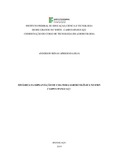Dinâmica da implantação de uma feira agroecológica no IFRN Campus Ipanguaçu

Visualizar/
Data
2019-12-19Autor
Silva, Anderson Renan Aprigio da
http://lattes.cnpq.br/3247856233451481
Metadado
Mostrar registro completoResumo
The high number of the world population, has a strong influence on the
agricultural system, causing a daily food need over the means of agricultural production, this
new demand brought habits that leveraged the use of pesticides and consequently the high
degradation of the environment, the imbalance of ecosystems, the rural exodus due to the
precarious conditions of the countryside, thus damaging the life of all living beings. In
counterpart to this ideology, new technologies and practices for sustainable production and
concern about the impacts of conventional agriculture are emerging. With this, agroecology
emerges as a science, “in the generation of knowledge aimed at building more sustainable
agri-food systems. The purpose of this study was to evaluate the dynamics of the
implementation of an agroecological fair in its facilities, enabling students to have direct
contact with producers in the region and thus another way to improve their professional
practice, besides generating income for family farmers in the region. from the Assú Valley.
The agroecological fair took place in the premises of the Federal Institute of Education,
Science and Technology of Rio Grande do Norte (IFRN) - Campus Ipanguaçu, it is located in
the Physical Base district, 4 km from the municipality of Ipanguaçu-RN. For the fair, the use
of tent-type tents, plastic tables, for ornamentation was used banners with phrases with
agroecological motifs both for the fair site and for the entrance of the campus, and another
banner containing the fair's logo. After the research was successful, a certain demand can be
verified on campus, which exceeded 30% of the quantitative margin of the target audience.
The responses collected show that there was a sufficient sample of the target audience to
assess the viability of the fair. agroecology on campus. The supply and demand ratio were
very satisfactory, obtaining 73.7% of sales, with 164 products from plant and animal origin
and 129 products, closing with 78.7% of sales, compared to handicrafts the quantity of input
was 30 products, and the output was 13 products sold, totaling 43.3% of sales, showing that
there was sufficient demand and the success of the fair is remarkable.



